Climate change
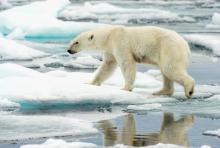
Most Americans say they feel a deep connection to the wider world.
But all that spiritual stargazing makes no difference in views about the facts of climate change and global warming, a new survey finds.
Just 5 percent of Americans thought climate change was the most important issue in the U.S. today. And religion was a major dividing point on how much — or how little — they think it’s a matter of concern, according to a new survey by the Public Religion Research Institute.
“We asked about spiritual measures such as being in awe of the universe, and you might think it would correlate with views about the universe. But, in fact, they have very little relationship,” said Robert Jones, CEO of PRRI, which conducted the survey on U.S. adults’ attitudes toward climate change, environmental policy and science.
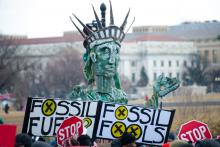
Last night, the Senate voted on the Keystone XL pipeline — and with only 59 votes, the bill failed. (In the current political climate, it takes 60 votes to make a bill filibuster-proof so that it actually passes.)
Right after the announcement, things got loud on the Senate floor. Someone from the gallery broke out into song. Although the C-SPAN cameras didn’t show them, someone was singing loudly in the Dakota/Lakota language from the gallery up above. That someone was Greg Grey Cloud, a member of the Dakota/Lakota Nation from the Rosebud Sioux reservation.
See, in some ways, the Keystone pipeline is a symbol. If President Obama lets the pipeline pass, it shows us that he isn’t actually the president who cares the most about climate change — even if he makes major agreements on climate change pollution with China or releases the Clean Power Plan for the EPA. If he lets the Keystone XL tar sands pipe be built, he’ll be undoing so much good work, cancelling it out with a fuel even dirtier than oil.
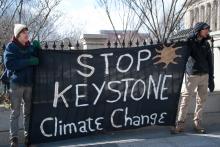
Tonight at 6:00, the Senate is holding a vote on the Keystone XL pipeline. I’ve been so excited lately by all the good thing happening in Congress, but this just might spoil my mood.
Here’s what has happened lately: President Obama met with Chinese President Xi Jinping, and the two of them agreed on a climate pollution-curbing deal. It’s a move that many people never thought possible, and it means big things for international climate talks. Also big news in that arena is Obama’s recent commitment of $3 billion to the Green Climate Fund, making us one of very few prosperous nations willing to help the world’s poor and vulnerable countries grapple with the climate impacts they are already facing – stronger storms, droughts that ravage subsistence farmers, rising sea levels that displace island nations. When the U.S. delegates show up at the U.N. climate talks in Lima two weeks from now, people might actually be happy to see us!
This week is an exciting one on the national level too. This afternoon at the EPA, a group of faith representatives will hand over our thousands of comments from people of faith who support the Clean Power Plan (and want to see the rule implemented well in every state).
But just when things were looking up, enter Congress. Here’s the basic scene:

If Quaker antislavery activist John Woolman were alive today, he would probably be doing everything in his power to resist the fossil fuel industries destabilizing our climate.
Woolman, who in the mid-1700s refused to cooperate with any aspect of the slave trade, would probably divest any ownership interest he had in big oil, gas, and coal companies. To profit financially from corporations that are destroying the planet would be unconscionable.
The divestment movement received a tremendous boost the day after 400,000 people took to the streets of New York City for the People’s Climate March. In advance of the United Nations Climate Summit on Sept. 22, the Rockefeller Brothers Fund — an $860 million foundation built on the oil fortune of John D. Rockefeller — announced its commitment to divest its holdings of fossil fuels.
This was the latest wave in a series of Divest-Invest announcements including the launch of Divest-Invest Individual, which facilitates a meaningful role for individuals in the divestment and reinvestment movements. More than 700 inaugural investors – with investments totaling $2.6 billion – announced their intention to divest from fossil fuel industries and reinvest in clean, renewable energy. Hundreds of individuals have since taken the pledge to stop new investments in fossil fuels and divest from the top 200 carbon-holding companies within five years.
“The destruction of the earth’s environment is the human rights challenge of our time,” said South African Archbishop Desmond Tutu in a video-taped message to the UN Climate Summit. He called on world leaders to freeze further exploration for new fossil fuel sources. “Divest from fossil fuels and invest in a clean energy future. Move your money out of the problem and into solutions.”
Today the House of Representatives is set to vote, yet again, on the Keystone XL Tar Sands Pipeline. This pipeline would move bitumen, a tar-like version of oil, from the Alberta tar sands in Canada down to the oil refineries and export areas in Texas. The pipeline is controversial because of the high carbon content of tar sands oil, the sensitive farmland, aquifer, and Native American land it passes through, and the risk of pipeline spills.
The Senate will vote on the Keystone pipeline – which would require President Obama’s signature since it crosses an international border with Canada – on Tuesday, but if it passes the House and the Senate, Obama will be faced with a choice: veto or sign. He has been silent on his final decision, stalling as the State Department goes through the review process (which raised conflict of interest concerns, as a contractor working for the pipeline company also wrote State Department’s Environmental Impact Statement).
You can call your Member of Congress to let them know where you stand on Keystone XL – find their phone number here: http://www.house.gov/representatives/find/
This morning, President Barack Obama and President Xi Jinping of China made a historic announcement that their countries would limit greenhouse gas emissions.
The United States and China are the world’s two largest consumers of energy and two largest emitters of greenhouse gases. Together, they account for 40 percent of the world’s emissions.
This announcement is a milestone for two reasons. First, this is the first time that China, the world’s No. 1 producer of greenhouse gas pollution, has made any pledge to limit its rapidly growing emissions. Second, this is a major breakthrough in U.S.-China relations that highlights what’s possible when the two superpowers work together on an issue.
Both leaders hope that this statement will inject momentum into global climate negotiations by putting pressure on other major countries to reflect on their own plans for major emissions reductions.
A written statement alone will not alter the course of climate action internationally. However, this announcement has laid a foundation for an international collaborative relationship on climate change. As President Xi told President Obama on Tuesday evening, “A pool begins with many drops of water.” For the sake of God’s creation let’s hope that the drops of climate change collaboration continue to gather.
For more on this story The Hill’s report.
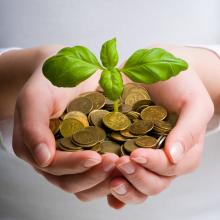
Editor’s Note : This is the first post in a new series about fossil fuel divestment and clean energy reinvestment. We’ll look at how and why people of faith might choose to divest from fossil fuels as a response to climate change.
When you really care about something, it’s important not to give up hope.
If one of the things you care about is climate change and the harm we are doing to God’s beautiful world, it’s pretty hard to keep the hope alive.
After all, the world’s leading peer-reviewed scientific authority on climate change, the Intergovernmental Panel on Climate Change, just released its most damning report ever, declaring that climate disruption is at this point “irreversible.”
And then let’s look at Congress. The United States has emitted more greenhouse gases than any other country in the world, and yet it’s been five years since Congress came anywhere near passing a major climate law. (And they failed to pass that Cap & Trade law). After the most recent election last week, Sen. James Inhofe (R-OK) — who once called global warming “the greatest hoax ever perpetrated on the American people” — is set to become the gatekeeper for all climate legislation.
This should come as no surprise. Fossil fuels – the main driver of our nation’s climate culpability – are a big business. We blow up mountains to get more coal, set up dangerous oilrigs in the Gulf of Mexico, pipe tar through the breadbasket of America, and use California’s limited water supply to hydrofrack for gas. When I say “we,” I mean the fossil fuel industry. The industry spends tons of money each year propping up climate deniers, spreading misinformation, and sowing seeds of doubt about what we are doing to God’s earth. They also fund political candidates on both sides of the aisle, buying silence from elected officials whose constituents are suffering from air and water pollution, historic drought, or stronger hurricanes.
In the face of all this, I have hope — for two reasons.
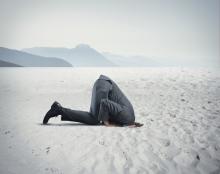
“The reason I speak to them in parables is that ‘seeing they do not perceive, and hearing they do not listen, nor do they understand.’ With them indeed is fulfilled the prophecy of Isaiah that says: ‘You will indeed listen, but never understand, and you will indeed look, but never perceive. For this people’s heart has grown dull, and their ears are hard of hearing, and they have shut their eyes” (Matthew 13:11-15)
Humans shut their eyes to truth.
This week, the Intergovernmental Panel on Climate Change released the final installment of its three-part synthesis report on climate change. According to Rajendra Pachauri, the chairperson of the IPCC, this report is the “strongest, most robust, and most comprehensive analysis” to come out of the IPCC, which has been tracking climate change since 1988. Yet, there are still some who are hard of hearing.
The data that lies within the report is nothing completely new: climate change is happening, humans are responsible for climate change, and fossil fuels are severely damaging our levels of CO2. So, what is different about the newest installment of the IPCC report?
The emergence of one word: irreversible.

Editor’s Note: Global warming means rising sea levels, worsening extreme weather events, and a threat to God’s creation and people. The world has not experienced normal global temperatures since 1985. So while some might call them millennials, anyone under the age of 30 is part of the “Climate Generation.” If you’re under 30, congrats! You’ve inherited a big problem. Bill Lewis has a letter to share, written to his two year old grandson, and to all those who will inherit a changed planet.
Dear Future Generations,
Today, a day that encompasses all that has gone before and precedes all that will come, I write as one whose heart breaks open with joy at an expanse of prairie or Southern Pine flatwoods stretching to the horizon. I write as one who thinks of your life, my little 2-year-old grandson, and what opportunities you might have to know the natural world. I write as one who thinks of this beautiful world that encompasses so much diversity in the creatures, plants, soils, and relationships. At first I was going to tell you what I think you should know. But now it seems that I have more questions than answers. Perhaps as you live into these questions and others that you will ask, you’ll grow in wisdom and stature and awe of God. Will there be any natural areas left? Will you have the opportunity to experience what was once the largest and most biologically diverse forest type in North America – Longleaf Pine? Will you be able to travel on foot away from concrete, autos, electricity? Will you be able to be in places where nature has the power and sculpts the landscape, rather than people?

Editor's Note: Global warming means rising sea levels, worsening extreme weather events, and a threat to God’s creation and people. The world has not experienced normal global temperatures since 1985. So while some might call them millennials, anyone under the age of 30 is part of the “Climate Generation.” If you’re under 30, congrats! You’ve inherited a big problem. Dorothy Boorse is a science professor, a Christian, and a parent, and she has some words for the Climate Generation.
Dear younger ones. You idealistic, smart, and entrepreneurial folks, take courage! I am speaking from an earlier generation, but one with you, caring for each other and our lovely world. I have two sons: one home-grown in the more common way, and one gained through a long process I often call “my paperwork labor.” For one of them, I ate for two, then sweated and yelled in an epic battle to get him out into the world. For the other, I had certificates of health and finances and assessments printed, travelled abroad, and got my husband to write an autobiography. Both were arduous journeys, and both of my sons are loved more than I can describe.
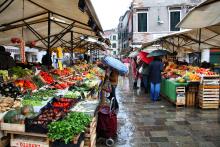
IT'S REASONABLY clear to me that the natural tendency of our society at this moment is toward smallness, localness, and intimacy. After several centuries of constantly extending our supply lines around the world so that our food and our energy and our capital came from every corner of the planet, we find it increasingly pleasing and increasingly necessary to hunker down.
Local food is the best example. Our best restaurants and our sharpest cooks are no longer concerned with copying French recipes; for a generation now it’s been all about what’s close to home. Farmers’ markets have been the fastest growing part of our food economy, and suddenly there are more breweries than there were before Prohibition. It tastes good; it feels neighborly.
Next on the agenda: local energy. All of a sudden it seems weird to be piping stuff in from Saudi Arabia, or even Texas, when there’s plenty of good sunshine to be had close to home, when the wind blows over your house more days than not. In the wake of the financial crisis, there’s even a move toward Slow Money and local banking. It’s possible to imagine how it might all fit together into something quite beautiful—a new/old world that actually kind of works, instead of the careening one we’re used to.


As climate change devastates communities in Kenya, church leaders are helping to address the crisis locally while also calling on industrialized nations to own up to their responsibilities for spewing greenhouse gas emissions into the atmosphere.
“But we (in Africa) also have a role to play because we have not been very good stewards of the environment,” added Gichira, a poverty and development expert.“I think they (industrialized nations) are responsible for most of the emissions,” said Peter Solomon Gichira, the climate change program officer at the All Africa Conference of Churches. “They have responsibility to support climate change adaptation and mitigation as a moral obligation.”
People living in the Global South such as Kenya are suffering the worst consequences, climate experts say.
Droughts have become more severe and recurrent and are frequently followed by excessive rains or floods. Temperatures are much higher and weather patterns are now unpredictable.
I GREW UP IN RURAL IRELAND in the 1950s in a world surrounded by trees.
Close to my home, a ribbon of horse chestnuts lined both sides of the road. Each summer their intertwining canopies shut out the light, which gave the road its name—the dark road. In the fields around our house there were stands of oak, birch, elm, and sycamore. About 40 yards to the south and west, my father planted a shelter belt of Leylandii. We had different varieties of apple trees in the orchard, and two pear trees.
In 1962, just as the Second Vatican Council was beginning, I entered St. Columban’s seminary to be a priest. The seminary was located on a large estate called Dowdstown in County Meath. More than 150 acres were covered in woodlands full of indigenous trees such as oak, hazel, holly, ash, Scotch pine, willow, elm, and rowan. There were also exotic species, including a number of the sturdy cedars of Lebanon, a variety of cherry trees, and even a few California redwoods. The folklore in the area was that the trees had been planted in the 1820s by Gen. Robert Taylor, who had fought alongside Wellington at the Battle of Waterloo.
Trees are the dominant life form on land—and the longest-lived creatures on earth. During my seven years in seminary, while studying philosophy, theology, spirituality, and scripture, we never once looked to the natural world or trees for insight into our relationship with God, other human beings, or other species. And there is so much to learn! Sadly, theology and scripture presentations were isolated almost exclusively to the divine-human relationship, with little consideration given to the rest of creation.
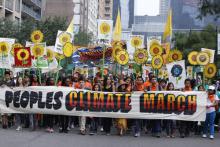
More important than the celebrities or politicians marching on Sunday, members of the faith community came out in droves to support the rally. The Huffington Post reported on the wide variety of faiths that were represented at the march. A reporter from Christianity Today wrote, “Almost every conceivable strand of society was represented in the huge column of humanity — not only were there groups of Methodists and Baptists rubbing shoulders with Catholics and Presbyterians, there were Christians marching with Muslims, Jews, pagans, atheists and Baha'i. Anti-capitalist protesters stood alongside 'Concerned Moms for the Climate;' doctors, firemen, and vegans held banners next to indigenous people and victims of Hurricane Katrina.”
The reasons that thousands of individuals came out to the streets of New York City on Sunday are vast and personal. But for many members of the faith community, spreading awareness about the decaying state of God’s creation was a moral obligation. Signs such as “Jesus Would Drive a Prius” and a life-size moving Arkrepresented the importance of taking care of God’s creation throughout the rally. In a recent interview with the National Catholic Reporter, Steffano Montano, a theology professor at Barry University in Miami, said as a Catholic, there's a spiritual responsibility to combat climate change.
"By understanding creation, we can come closer to the Creator. It's an added spiritual responsibility. Justice for the earth is something that affects everybody. It's going to affect my daughter, my grandkids. It affects the poor in ways we are still trying to come to terms with. And it's our fault. So that's why we're here. It's on us to make a difference," said Montano.


